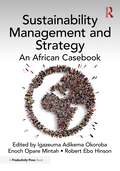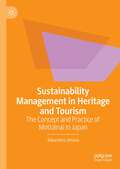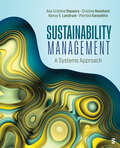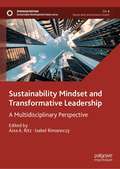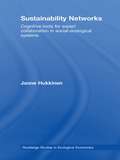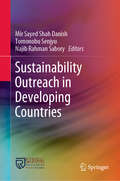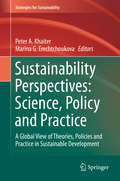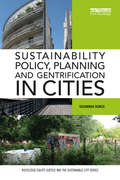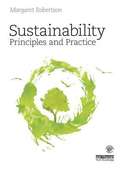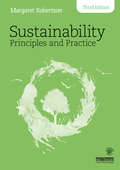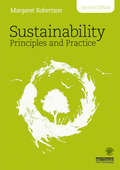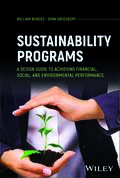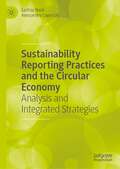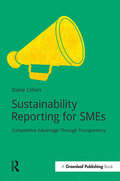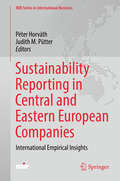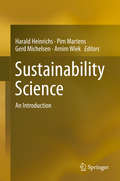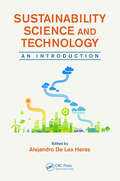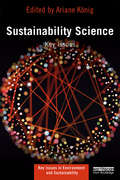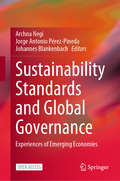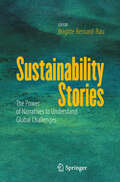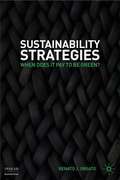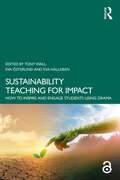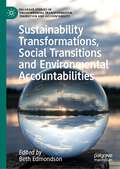- Table View
- List View
Sustainability Management and Strategy: An African Casebook
by Robert Ebo Hinson Enoch Opare Mintah Igazeuma Adikema OkorobaWith Africa predicted to emerge as a leading market in the coming years, the debate on sustainability, especially on the mitigation of business impact on the continent’s environment and society, cannot be underestimated. Prior to the worsening impact of climate change, the continent has historically been struggling to consolidate sustainability efforts in driving social and environmental protection caused by both foreign (majorly) and local business activities in the region. To capture current social and environmental injustice plaguing the African continent, Secretary‑General Prof. Petteri Taalas of the World Meteorological Organization (WMO) opined that "Africa is responsible for less than 10 percent of global greenhouse gas emissions, but it is the continent which is the least able to cope with the negative impacts of climate change. Heatwaves, heavy rains, floods, tropical cyclones, and prolonged droughts are having devastating impacts on communities and economies, with increasing numbers of people at risk."Sustainability Reporting Frameworks have empowered sustainability leaders, most especially Chief Sustainability Officers (CSOs), in organizations to develop practical strategies for leading sustainability‑related issues while driving systemic change for collective thinking towards mitigating the impact of climate change on society and the environment. While there is undoubtedly a plethora of standards, codes, and toolkits to help frame the sustainability drive, with leading CSOs around the globe sharing their lived experiences, the narrative for best practices, and what the content of sustainability initiatives and reporting should be have been skewed to the Western or advanced economies’ narrative. This reporting has drowned out other continent‑specific narratives that offer a diverse pool of perspectives and locally rich content on some sustainability actions and achievements, especially from CSOs. The role of business sustainability leaders and CSOs in Africa in positioning the continent as the "market of tomorrow" with sound and robust sustainability practices needs to be spotlighted. Owing to the gap, this book brings the urgency to light through case studies and stories from leading African businesses, while capturing their sustainability strategies and achievements. This book moves beyond the experience and context of business in advanced economies and responds to the need for an alternative narrative of sustainability leadership in Africa. The focus of this book is on the role of sustainability leadership over the last decade and discusses the contributions and challenges of navigating this multi‑disciplinary function in different sectors. The authors share their insight into this under‑researched and under‑reported perspective highly relevant to business and sustainability, and environmental, social, and governance (ESG) reporting in a growing region like Africa.
Sustainability Management in Heritage and Tourism: The Concept and Practice of Mottainai in Japan
by Takamitsu JimuraIncreasingly, the tourism industry is looking towards sustainability, responding to public demand and local environmental policy. This monograph explores the concept of sustainability in the context of heritage and tourism studies, as well as examining the practices adopted to realize or enhance the sustainability of these industries. Beginning with a broad overview, outlining the theory and scholarly landscape, this book then focuses on cases of sustainable tourism in Japan, exploring the concept of ‘mottainai’. Mottainai is a traditional Japanese term and means an ethical attitude towards the use of a range of resources needed for human life. This Japanese word can be understood as ‘what a waste’, and can promote the environmentally-friendly way of life, encouraging reduce, reuse and recycle.This book will be of interest to scholars and students of heritage, tourism, and sustainability management; both those interested in Japan specifically, and those who are interested in new approaches for sustainability in tourism management.
Sustainability Management: A Systems Approach
by Ana Cristina Siqueira Cristina Neesham Nancy E. Landrum Patricia KanashiroConsumer demand for sustainable business practices has never been greater. Sustainability Management uses a systems thinking approach to illustrate the interdependencies among ecosystems, societies, organizations, and individuals. Authors Ana Cristina Siqueira, Cristina Neesham, Nancy E. Landrum, and Patricia Kanashiro explain why sustainability presents risks and opportunities for businesses, how sustainability can be a source of competitive advantage, and the business impact on the environment and society. This timely new text examines some of today’s most pressing issues including social justice, racial equity, human rights, and climate crisis. Case Studies tied to UN Sustainable Development Goals spotlight innovative sustainable strategies from companies around the world.
Sustainability Management: A Systems Approach
by Ana Cristina Siqueira Cristina Neesham Nancy E. Landrum Patricia KanashiroConsumer demand for sustainable business practices has never been greater. Sustainability Management uses a systems thinking approach to illustrate the interdependencies among ecosystems, societies, organizations, and individuals. Authors Ana Cristina Siqueira, Cristina Neesham, Nancy E. Landrum, and Patricia Kanashiro explain why sustainability presents risks and opportunities for businesses, how sustainability can be a source of competitive advantage, and the business impact on the environment and society. This timely new text examines some of today’s most pressing issues including social justice, racial equity, human rights, and climate crisis. Case Studies tied to UN Sustainable Development Goals spotlight innovative sustainable strategies from companies around the world.
Sustainability Mindset and Transformative Leadership: A Multidisciplinary Perspective (Sustainable Development Goals Series)
by Isabel Rimanoczy Aixa A. RitzThis volume examines the importance of leadership in developing an effective sustainability strategy. It defines the sustainability mindset and surveys the primary motivations, conditions, or environment(s) that cause leaders to embrace sustainable practices. As described in the UN Sustainable Development Goal 8, embracing the sustainability mindset will lead to greater productivity and promote economic growth.Organized into themes of organizational operations, leadership competencies, and leadership practices, the chapters, written by contributors representing global perspectives, tackle topics such as strategy, culture, and leadership styles in developing a new form of mindfulness for leaders as well as organizations. Recognizing the need for accelerated change in organizations as well as society at large, this book presents scholars with a framework for establishing a mindset for sustainability to foster much-needed transformative leadership.
Sustainability Networks: Cognitive Tools for Expert Collaboration in Social-Ecological Systems (Routledge Studies in Ecological Economics #1)
by Janne HukkinenSustainability is a word that means different things depending on who is using it, thus underlining the potential problems involved in experts from different fields teaming up to tackle sustainability problems. In this book, Janne Hukkinen argues for a reflexive approach to sustainability as a means of coming to grips with the threatening challenges arising out of human-environment interaction. The author illustrates his argument with a case study of natural resource management in Lapland, showing how sustainability is understood holistically by academics and professionals alike. This book reflects an emerging cognitive turn in sustainability sciences, conceptualizing environmental challenges during action on our social and material environments, rather than in isolation. Hukkinen argues that this conceptual blending enables sustainability experts to hybridize themselves: to immerse themselves in the fields of other experts and imagine the other's work - both prerequisites of trans-disciplinary knowledge integration. This book shows how sustainability experts can reveal their intellectual engagements when designing scenarios and indicators and presents a rigorous framework for organizing expert collaboration.
Sustainability Outreach in Developing Countries
by Tomonobu Senjyu Mir Sayed Shah Danish Najib Rahman SaboryThis book presents a comprehensive collection of recent research on the timely topic of sustainable development goals, with a focus on developing countries. In this manner, it furnishes interdisciplinary coverage in terms of sustainable development; it sets forth the pillars of sustainability (environmental, technical and technological, social, institutional, and economic disciplines); and it explores the adaption of these pillars for long-term sustainability.With its survey of transboundary research, experiences, and lessons learned, the book offers integrated conceptual and empirical contributions from diverse interrelated fields. Viable options are set forth for societies in transition in the twenty-first century to achieve well-being in the lives of their people through the eradication of poverty, mitigation of climate change, promotion of lifelong learning opportunities, and empowerment of society. These options also make it possible to deploy affordable energy, sustain economic growth, offer innovation, reduce inequality, and finally, to help ensure global sustainability.
Sustainability Perspectives: A Global View of Theories, Policies and Practice in Sustainable Development (Strategies for Sustainability)
by Peter A. Khaiter Marina G. ErechtchoukovaThe book presents methodological and applied aspects of sustainability and sustainable management from different countries and regions around the globe. It discusses approaches to sustainability assessment, demonstrates how ideas of sustainability and sustainable management are incorporated into public policies and private actions at local and national levels. Authors focus on promoting greater sustainability in natural resource management, energy production and storage, housing design, industrial reorganization, coastal planning, land use, and business strategy, including sustainability indicators, environmental damages, and theoretical frameworks. Chapters reflect environmental, economic and social issues in sustainable development, challenges encountered, and lessons learned as well as solutions proposed.
Sustainability Policy, Planning and Gentrification in Cities (Routledge Equity, Justice and the Sustainable City series)
by Susannah BunceSustainability Policy, Planning and Gentrification in Cities explores the growing convergences between urban sustainability policy, planning practices and gentrification in cities. Via a study of governmental policy and planning initiatives and informal, community-based forms of sustainability planning, the book examines the assemblages of actors and interests that are involved in the production of sustainability policy and planning and their connection with neighbourhood-level and wider processes of environmental gentrification. Drawing from international urban examples, policy and planning strategies that guide both the implementation of urban intensification and the planning of new sustainable communities are considered. Such strategies include the production of urban green spaces and other environmental amenities through public and private sector and civil society involvement. The resulting production of exclusionary spaces and displacement in cities is problematic and underlines the paradoxical associations between sustainability and gentrified urban development. Contemporary examples of sustainability policy and planning initiatives are identified as ways by which environmental practices increasingly factor into both official and informal rationales and enactments of social exclusion, eviction and displacement. The book further considers the capacity for progressive sustainability policy and planning practices, via community-based efforts, to dismantle exclusion and displacement and encourage social and environmental equity and justice in urban sustainability approaches. This is a timely book for researchers and students in urban studies, environmental studies and geography with a particular interest in the growing presence of environmental gentrification in cities.
Sustainability Principles and Practice
by Margaret RobertsonSustainability Principles and Practice gives an accessible and comprehensive overview of the interdisciplinary field of sustainability. The focus is on furnishing solutions and equipping the student with both conceptual understanding and technical skills for the workplace. Each chapter explores one aspect of the field, first introducing relevant theory and presenting issues, then supplying tools for working toward solutions. Elements of sustainability are examined piece by piece, and wide coverage ranges over ecosystems, social equity, environmental justice, food, energy, product life cycles, cities, and more. Techniques for management and measurement as well as case studies from around the world are provided. Chapters include further reading, discussion questions, and problems to foster quantitative thinking. The book is supported by a companion website with key website links, detailed reading lists, glossary, and additional case studies, together with numerous projects, research problems, and group activities, all of which focus on real-world problem solving of sustainability issues. The textbook is designed to be used by undergraduate college and university students in sustainability degree programs and other programs in which sustainability is taught.
Sustainability Principles and Practice
by Margaret RobertsonSustainability Principles and Practice gives an accessible and comprehensive overview of the interdisciplinary field of sustainability. The focus is on furnishing solutions and equipping students with both conceptual understanding and technical skills. Each chapter explores one aspect of the field, first introducing concepts and presenting issues, then supplying tools for working toward solutions. Elements of sustainability are examined piece by piece, and coverage ranges over ecosystems, social equity, environmental justice, food, energy, product life cycles, cities, and more. Techniques for management and measurement as well as case studies from around the world are provided. The 3rd edition includes greater coverage of resilience and systems thinking, an update on the Anthropocene as a formal geological epoch, the latest research from the IPCC, and a greater focus on diversity and social equity, together with new details such as sustainable consumption, textiles recycling, microplastics, and net-zero concepts. The coverage in this edition has been expanded to include issues, solutions, and new case studies from around the world, including Europe, Asia, and the Global South. Chapters include further reading and discussion questions. The book is supported by a companion website with online links, annotated bibliography, glossary, white papers, and additional case studies, together with projects, research problems, and group activities, all of which focus on real-world problem-solving of sustainability issues. This textbook is designed to be used by undergraduate college and university students in sustainability degree programs and other programs in which sustainability is taught.
Sustainability Principles and Practice: Principles And Practice
by Margaret RobertsonSustainability Principles and Practicegives an accessible and comprehensive overview of the interdisciplinary field of sustainability. The focus is on furnishing solutions and equipping the student with both conceptual understanding and technical skills for the workplace. Each chapter explores one aspect of the field, first introducing relevant theory and presenting issues, then supplying tools for working toward solutions. Elements of sustainability are examined piece by piece, and wide coverage ranges over ecosystems, social equity, environmental justice, food, energy, product life cycles, cities, and more. Techniques for management and measurement as well as case studies from around the world are provided. Chapters include further reading, discussion questions, and problems to foster quantitative thinking. The book is supported by a companion website with key website links, detailed reading lists, glossary, and additional case studies, together with numerous projects, research problems, and group activities, all of which focus on real-world problem solving of sustainability issues. The textbook is designed to be used by undergraduate college and university students in sustainability degree programs and other programs in which sustainability is taught.
Sustainability Programs: A Design Guide to Achieving Financial, Social, and Environmental Performance
by William Borges John GrosskopfGo-to guidance for designing, implementing, and managing effective sustainability programs and their management systems Moving past vague concepts, buzzword overloads, superficial efforts, and flavor-of-the-month misdirections, Sustainability Programs presents a pragmatic, step-by-step approach to creating and managing adaptable, organization-wide sustainability programs to achieve People, Planet, and Profit (3P) objectives with least cost, effort, and risk. Key steps covered in this book include reaching a programmatic “Go” decision, developing sustainability policies, designing an organizational framework, defining the most pressing sustainability needs, and cascading 3P goals, tactics, targets, and initiatives into business units, functions, and departments to create new capabilities and improve performance. By following the principles and practices in this book, any organization can better achieve sustainability’s full promise of social responsibility, environmental stewardship, and financial performance. Written by authors with a wealth of practitioner experience in the field, Sustainability Programs explores topics including: Creating social, environmental, and financial strategies, tactics, targets, and initiatives that create new capabilities and resolve 3P performance issuesAvoiding ad hoc projects that fail to address critical sustainability issues, wasting valuable resources and squandering competitive advantagesOvercoming technical professionals’ lack of business management experience and helping management professionals understand sustainability’s benefits and intricaciesUnderstanding sustainability through the management lenses of risk reduction, improved efficiencies through eradication of wastes, increased revenues via innovation, and enhanced competitive advantages fueled by greenwash-free transparency.Responding to the demanding data capture, analysis, and reporting challenges of environmental, social, and governance (ESG). Acknowledging that one size does not fit all, this book delivers individual concepts and methods adaptable across any organization’s value chains. It is an essential read for leaders and practitioners working within private and public enterprises of all types and sizes, especially those with 2,000 to 5,000 employees.
Sustainability Reporting Practices and the Circular Economy: Analysis and Integrated Strategies
by Alessandro Capocchi Sarfraz NazirThe Circular Economy (CE) and CE-related approaches are increasingly prominent in corporate strategy, with potential environmental, social, and economic benefits to the organization. However, a comprehensive framework that incorporates CE with governance and reporting practices, providing accurate assessments of CE’s success in achieving sustainability targets and other goals, is not yet in place. This book addresses that gap, analyzing the relationship between CE and sustainable development practices, company performance, and to what extent organizations have disclosed this information in annual reporting practices. It proposes different frameworks to evaluate the environmental, social, and economic impact of CE and how CE might be promoted, disclosed, and accurately assessed in reporting practices. It will be of great interest to researchers and students of sustainable development, governance, accounting, and business economics, as well as practitioners seeking a research-based framework for integrating CE into their business reporting.
Sustainability Reporting for SMEs: Competitive Advantage Through Transparency (Doshorts Ser.)
by Elaine CohenSustainability reporting can help companies make more money. Sustainability Reporting for SMEs shows you how. Reporting, done well, requires a company to make public a set of promises that bind the company to its sustainability commitments. By adopting a transparent approach to both business practice and reporting, SMES can gain significant business advantage, both in terms of more effective internal processes and in terms of reputation and business-building.Elaine Cohen provides guidance and tools for actual actions that will improve the sustainability impacts of your company, and a process for reporting that adds value which is much greater than the printed or online report itself. This book will help SMEs develop "the transparency habit" so that they both make more money and contribute more proactively to the sustainability of our society and planet.It is vital reading for SME owners and managers, entrepreneurs, business and sustainability students and teachers, and consultants. Sustainability managers in larger organisations will find this book helpful in assisting their organisations manage their supply chains which undoubtedly include several SMEs.
Sustainability Reporting in Central and Eastern European Companies: International Empirical Insights (MIR Series in International Business)
by Péter Horváth Judith M. PütterThis collection of expert articles highlights the standards and practices concerning sustainability reporting among companies in Central and Eastern Europe (CEE). Due to the growing interest in corporate social responsibility issues, sustainability reporting has become increasingly common among businesses that claim to adhere to certain social, environmental and economic standards. While it can be observed that sustainability reporting is widely practiced in Western and Northern European countries, only few studies have been conducted on this topic in the CEE region. Drawing on a major empirical study involving researchers from 10 different CEE countries, this book addresses the status quo of sustainability reporting, outlines future prospects and provides essential recommendations for practitioners.
Sustainability Science
by Pim Martens Gerd Michelsen Harald Heinrichs Arnim WiekThis textbook provides a comprehensive compilation of conceptual perspectives, methodological approaches and empirical insights of inter- and transdisciplinary sustainability science. Written by an international team of authors from leading sustainability institutions, the textbook covers key perspectives and topics of the scientific discourse on sustainable development. More than two decades after conceptualizing sustainability as societal guiding vision and regulative idea the necessity of concretizing and realizing sustainability in societal praxis is bigger than ever. Sharply improved individual and societal sustainable decision-making and action is necessary for a better future of humankind and the planet. On that account problem- and solution-oriented perspectives and competencies are crucial. The different chapters assemble an encompassing view of essential foundations and specific areas of research and action in sustainability science and practice. The textbook aims at fostering the further establishment of sustainability science in higher education and to enable the next generation of sustainability experts to tackle the challenging and exciting topic of sustainable development.
Sustainability Science
by Bert J. M. de VriesSustainable development is becoming the guiding principle for the twenty-first century. This textbook – based on the author's course and rigorously class-tested by his students – provides an introduction into patterns of past and present (un)sustainable development and into the emergence of the notion of sustainable development. It systematically surveys the key concepts, models and findings of the various scientific disciplines with respect to the major sustainability issues: energy, nature, agro-food and resource systems, and economic growth. System analysis and modelling is introduced and used as an integrating tool. Stories and worldviews are used to connect the quantitative and the qualitative and to offer the reader an understanding of relevant trends and events in context. Sustainability Science is an ideal textbook for advanced undergraduate and graduate level courses in sustainable development and in environmental and resource science and policy.
Sustainability Science and Technology: An Introduction
by alejandro de las herasSustainability Science and Technology: An Introduction explains the root causes of global failures in natural and human systems, as well as the most readily available technological solutions. The book dispels risky scientific and technological ideas that further complicate the current environmental and socioeconomic predicaments. It also bridges ga
Sustainability Science: Key Issues (Key Issues in Environment and Sustainability)
by Jerome Ravetz Ariane König<p>Sustainability Science: Key Issues is a comprehensive textbook for undergraduates, postgraduates, and participants in executive trainings from any disciplinary background studying the theory and practice of sustainability science. Each chapter takes a critical and reflective stance on a key issue or method of sustainability science. Contributing authors offer perspectives from diverse disciplines, including physics, philosophy of science, agronomy, geography, and the learning sciences. <p>This book equips readers with a better understanding of how one might actively design, engage in, and guide collaborative processes for transforming human-environment-technology interactions, whilst embracing complexity, contingency, uncertainties, and contradictions emerging from diverse values and world views. Each reader of this book will thus have guidance on how to create and/or engage in similar initiatives or courses in their own context. <p>Sustainability Science: Key Issues is the ideal book for students and researchers engaged in problem and project based learning in sustainability science.</p>
Sustainability Standards and Global Governance: Experiences of Emerging Economies
by Archna Negi Jorge Antonio Pérez-Pineda Johannes BlankenbachThis open access book focuses on the issue of sustainability standards from the perspective of both global governance frameworks and emerging economies. It stems from the recognition that the accelerated pace of economic globalization has generated production and consumption patterns that are generating sustainability concerns. Sustainability standards (and regulations) are increasingly being used in a bid to make global consumption and production more sustainable. Given the dense inter-connectedness of economic affairs globally, the use of sustainability standards has become a concern of global governance, who face the challenge of achieving a balance between the use of standards for genuine sustainability objectives, and not allowing them to turn into instruments of protectionism or coercion.The emerging economies, given their increasing engagement with the global economy, are most impacted by the use of sustainability standards. The emphasis of ‘emerging economies’ in this book is retained both by using case studies from these economies and by collating perceptions and assessments of those located in these economies. The case studies included span sectors such as palm oil, forestry, food quality, vehicular emissions and water standards, and address the problems unique to the emerging economies, including capacity building for compliance with standards, adapting international standards in domestic contexts and addressing the exclusion of small and medium enterprises etc. Complex interfaces and dynamics of a global nature are not limited to the thematic of this book but also extend to the process through which it was written. This book brings together insights from developed as well as emerging economies (Germany, India, Mexico, Brazil, Indonesia, Pakistan, Mexico and China). It also brings together scholars and practitioners to jointly ponder upon the conceptual aspects of the global frameworks for sustainability standards. This book is a very useful resource for researchers and practitioners alike, and provides valuable insights for policy makers as well.
Sustainability Stories: The Power of Narratives to Understand Global Challenges
by Brigitte Bernard-Rau"Sustainability Stories" is an impactful book that offers a global perspective on the grand theme of sustainability. Through the lens of practitioners deeply committed to this cause, the book amplifies sometimes unheard voices, inspiring readers from diverse backgrounds to embrace environmental, social, and financial responsibilities. Each contributor, whether an entrepreneur, professor, lawyer, artist, or sustainability expert, acts as a visionary communicator, forging connections and leading by example. Featuring over 30 narratives from countries such as France, Germany, India, Morocco, Spain, Switzerland, and the United States, "Sustainability Stories" is sure to engage an international audience. Through its pages, this book spreads optimism, determination, and a desire for positive societal change. It empowers readers of all ages and educational backgrounds to join the movement toward a sustainable future. By sharing unique insights and experiences, "Sustainability Stories" serves as a catalyst, inspiring individuals to take action and make a difference in their professional practices, communities and lives.
Sustainability Strategies
by Renato J. OrsatoThe request on managers to base eco-investments on solid grounds has never been so vital. They need to know what they should do first, and why. Should they focus on generating carbon credits via eco-efficiencies? Enhance corporate reputation by joining Green Clubs? Subscribe to eco-label programs? Explore emerging cleantech markets? Within the overwhelming possibilities, many spend precious resources without sound criteria. By analyzing the rationales for sustainability strategies, this book addresses a timely question for managers, academics and MBAs: “when does it pay to be green?” Based on solid theoretical foundations and empirical research, it clarifies the elements involved in the formation and evaluation of sustainability strategies in firms, helping managers to prioritize eco-investments and transform them into sources of competitive advantage and new market spaces. Sustainability Strategies delves particularly deep into the troublesome global auto industry. By identifying the roots of economic and environmental problems of the sector, the book shows how to develop Sustainable Value Innovation: the creation of differential value for customers and contribution to society at both, reduced costs and environmental impacts.
Sustainability Teaching for Impact: How to Inspire and Engage Students Using Drama
by Tony Wall Eva Österlind Eva HallgrenSustainability Teaching for Impact is an essential step-by-step, practical guide for those wanting to inspire and engage higher education students in the areas of sustainability.This book encourages new and experienced university teachers across disciplines to adopt and adapt dramatic methods, with a view to develop their teaching. It introduces applied drama and performance arts methods that have been tried-and-tested across disciplines to deepen and broaden sustainability knowledge, skills, mindsets, and practices. Sustainability Teaching for Impact assumes no previous experience of the methods, as university teachers – with and without experience in drama – carefully walk you through some of the teaching practices they have used to create an impact in their teaching.This book is for higher and further education tutors who wish to build on their experience and deliver exciting and accessible classroom techniques and practices that are highly interactive, creative, and engaging to help further the teaching of sustainability.The Open Access version of this book, available at www.taylorfrancis.com, has been made available under a Creative Commons Creative Commons Attribution (CC-BY) 4.0 license.
Sustainability Transformations, Social Transitions and Environmental Accountabilities (Palgrave Studies in Environmental Transformation, Transition and Accountability)
by Beth EdmondsonThis book draws upon diverse approaches and understandings of sustainability transformations, social transitions and environmental accountabilities. It presents case studies that highlight real-world consequences of changing ideas about how best to achieve effective and durable sustainability transformations and examines how environmental accountabilities and social transitions influence sustainability transformations. Each chapter provides insights regarding how new knowledge and perspectives matter for whether, when, and how people, governments, corporations and international organisations seek and pursue solutions to social-ecological challenges and sustainability dilemmas. It pays sustained attention to whether and how understandings and applications of accountability can improve international sustainability transformations. The chapters presented in this book consider some pressing questions concerning social transitions and environmental accountabilities: how can they contribute to sustainability transformations, how do they influence the scalability of sustainability transformations, and, how can such sustainability transformations become durable?
